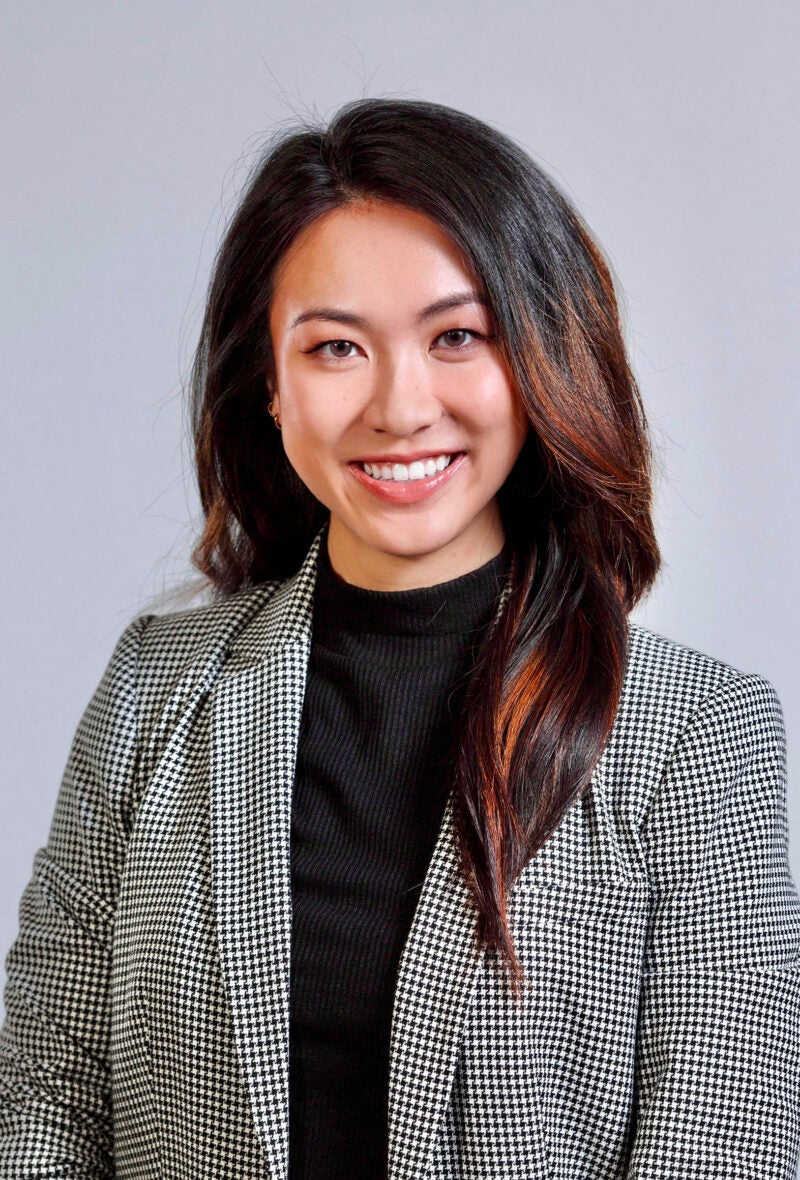Alice Hu ’24, a second-year student at Harvard Law School, knows what it is like to have to find one’s place in higher education. As a first-generation law student, Hu says that her personal and professional mission is to “increase access for students who come from underserved backgrounds, whether that be first-gen or low-income, and to empower marginalized communities everywhere.”
Hu was recently elected president of the National Asian Pacific American Law Student Association, a national organization founded in 1981 to represent and support Asian Pacific American law students and the larger legal community. She grew up in the city of Philadelphia and attended Harvard College, graduating magna cum laude. “I was raised by an immigrant single mother who worked three jobs to support our dreams, and educated by public school teachers who saw potential in me,” she says. “Having had the opportunity to go to Harvard College and HLS, I think my responsibility is to keep those doors open for those who come after me, and to lower the barriers that it takes to get through those doors.”
Hu intends to do just that as the new head of NAPALSA, the umbrella organization connecting Asian Pacific American Law Student Association (APALSA) chapters at law schools across the country. At around 350 members, Harvard’s APALSA, of which Hu is the political chair, is the largest chapter, and Hu says she is excited to share what she has learned from HLS and Harvard APALSA with law students coast-to-coast.
“I think it speaks to just how vibrant and active the HLS campus community is when it comes to student organizations,” she says of Harvard APALSA’s breadth. She adds that because of its size and alumni base, “APALSA at HLS organizes a lot of events. We host speakers who are renowned lawyers, scholars, politicians, leaders of all sectors multiple times every week.”
But, she notes, “As president, I see that isn’t the case for all law schools. At many law schools, there is no organized community for the handful of Asian American and Pacific Islander (AAPI) law students.”
Hu hopes to rectify that disparity by bringing together students and expanding access to professional networks, mentorship, and community. She plans to organize in-person local events for all regions of the country, from D.C. to California, as well as virtual events in partnership with national legal and affinity organizations.
Especially close to Hu’s heart is support for first-gen law students, a label she says applies to AAPI law students. “Many of us are the first person in our family to attend law school or college, even as the legal profession continues to really struggle with inclusion and representation.”
Hu wants AAPI students to know they belong at law school, and to do that she hopes to build a national community that goes beyond professional networking. “The personal comes before the professional. To make our profession better, we need to be able to have meaningful conversations and relationships that are not just professionally-focused,” she says.
Hu is also a Teaching Fellow at the Berkman Klein Center for Internet & Society’s Cyberlaw Clinic, a research assistant for Professor James Greiner at the HLS Access to Justice Lab, a representative of the Harvard Graduate Council and HLS Wellbeing Working Group, and on the board of the Harvard Law Entrepreneurship Project. She says she looks forward to continuing to build connections with other groups both at Harvard Law School and nationally to amplify their collective power to make change. “What’s so inspiring about being at HLS is just seeing how many student organizations and student leaders are working on expanding our idea of what a lawyer looks like, and what a leader looks like.”
She praises other efforts at Harvard Law as well, especially an influential class on Asian Americans and the law, taught by Mark Wu, the Henry L. Stimson Professor of Law. She says the class has been a transformative exploration of the legal history of exclusion and discrimination in the United States faced by members of the AAPI community. “To be able to learn more about what we know from our personal experience and our families’ experiences in a Harvard Law School classroom,” she says, “really makes a difference.”
These challenges are not limited to the past, Hu notes, pointing to the recent rise in anti-Asian hate crimes and discrimination across the U.S. She sees law students as part of the solution. “We as Harvard Law School students in particular have a responsibility to look at our role as lawyers inheriting this history and see how we can use our roles as agents of change.”
As the new president of NAPALSA, Hu says these commitments keep her grounded in her work to ensure that first generation, AAPI, and other law students from historically marginalized backgrounds have the tools they need to succeed in the field — and fight for equality.
“I think lawyers are in a position to either expand or constrict equality and the dignity of individuals and communities,” she says. “I believe in the cause, and to me, it’s not just about supporting Asian American law students, although that is a central part of the mission. It is one puzzle piece, among all these communities coming together and working together to advance justice.”
Want to stay up to date with Harvard Law Today? Sign up for our weekly newsletter.
